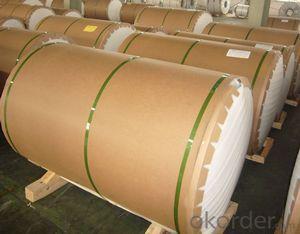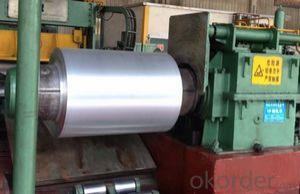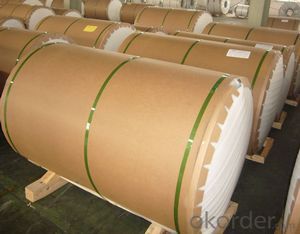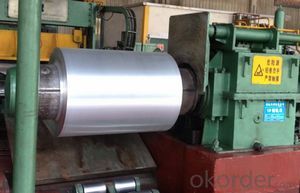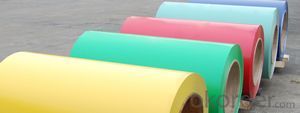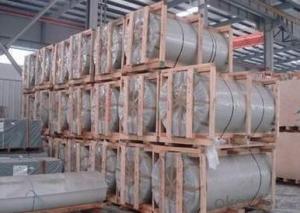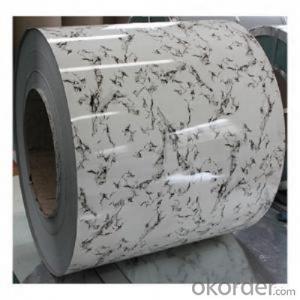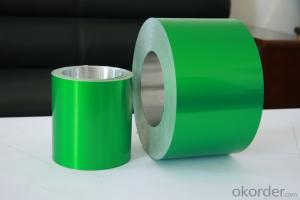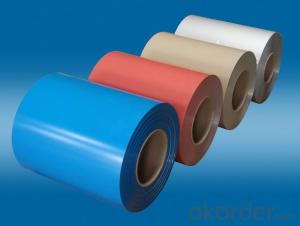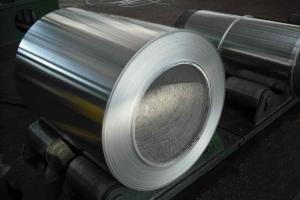AA1050 Coated Aluminum Coil Embossing Machine
- Loading Port:
- China Main Port
- Payment Terms:
- TT OR LC
- Min Order Qty:
- -
- Supply Capability:
- -
OKorder Service Pledge
Quality Product, Order Online Tracking, Timely Delivery
OKorder Financial Service
Credit Rating, Credit Services, Credit Purchasing
You Might Also Like
supply Mill-finished / coated aluminum plate/sheet/ coil:
Alloy: AA1050,1060,1100,1200,2024,3003,3304,3005,3015,5052,5086,5754,5083,6061,7050,7475,8011, etc
Temper: O, H14/16/18/22/24/32/ H112/H321/T6,T851,T7451,T7351, etc
Thickness: 0.02mm—20mm
Width: 100mm—2000mm (Can be slitted)
Notice: PE coating / PVDF coating / Embossment can be done if required.
- Q: How are aluminum coils tested for dimensional accuracy?
- Various methods are used to test the dimensional accuracy of aluminum coils to ensure they meet the required specifications. One method commonly employed is the use of specialized equipment like calipers, micrometers, and digital measuring devices. These tools enable precise measurement of the coils' width, thickness, and length. During the testing process, a sample coil is chosen and measured at different points along its length to detect any variations or deviations from the specified dimensions. This helps identify any potential issues with the coil's dimensional accuracy. In addition to manual measurements, advanced technologies such as laser scanning systems and optical sensors are also utilized. These technologies allow for non-contact measurements, resulting in faster and more accurate assessments of the coil's dimensions. Laser scanners create a digital representation of the coil's surface, which can then be compared to the desired specifications to determine the presence of any deviations. Furthermore, computerized systems are employed to analyze the collected data and generate detailed reports. These reports provide comprehensive information about the coil's dimensional accuracy, highlighting any discrepancies from the required standards. This data analysis enables manufacturers to promptly identify and address any potential problems. In conclusion, stringent testing procedures are applied to aluminum coils to ensure their dimensional accuracy. The combination of manual measurements, advanced technologies, and computerized analysis provides a thorough assessment of the coils' dimensions. This enables manufacturers to maintain high-quality standards and deliver products that meet the precise specifications demanded by various industries.
- Q: also, can aluminum become oxidized when secured down with metal nuts and bolts vice stainless steel nuts and bolts?
- The oxidation is the white powdery stuff on the metal. It can be cleaned with aluminum cleaner. Exposure to the weather can cause the rust, electric current. I advise using a sealer on the metal to keep it clean.
- Q: What are the properties of aluminum coils?
- Aluminum coils possess several key properties that make them highly sought after in various industries. Firstly, aluminum coils have a high strength-to-weight ratio, meaning they are lightweight yet durable. This characteristic makes them ideal for applications where weight reduction is crucial, such as in the aerospace industry. Additionally, aluminum coils exhibit excellent corrosion resistance. The formation of a thin, protective oxide layer on the surface of the metal helps prevent further oxidation, making them suitable for outdoor and marine environments. This corrosion resistance also translates to a longer lifespan, reducing maintenance requirements and costs. Another important property of aluminum coils is their high thermal conductivity. This feature allows for efficient heat transfer and makes them well-suited for applications in the heating, ventilation, and air conditioning (HVAC) industry. Furthermore, aluminum coils have excellent electrical conductivity, making them favorable for use in electrical and electronic components. Aluminum coils are also highly malleable and ductile, allowing for easy shaping and forming. This versatility makes them a popular choice in manufacturing processes, such as in the production of automobile parts, cans, and packaging materials. Lastly, aluminum coils are known for their recyclability. They can be easily melted down and reused without compromising their quality, making them an environmentally friendly choice. This recyclability aspect aligns with the increasing focus on sustainability and reducing the environmental impact of various industries. In summary, aluminum coils possess properties such as high strength-to-weight ratio, corrosion resistance, thermal and electrical conductivity, malleability, and recyclability. These properties make them valuable in numerous applications across various industries.
- Q: Can aluminum coils be used in automotive body panels?
- Automotive body panels can indeed utilize aluminum coils. Being both lightweight and corrosion-resistant, aluminum proves to be a suitable material for automotive purposes. The employment of aluminum coils in body panels yields numerous benefits, such as enhanced fuel efficiency owing to the reduced vehicle weight, improved handling and maneuverability, and increased durability. Moreover, aluminum boasts high recyclability, rendering it an environmentally conscious alternative for automotive production. Numerous automakers have already begun integrating aluminum coils into their vehicles, and this trend is anticipated to persist as the industry aims for lighter and more environmentally sustainable automobiles.
- Q: I need to draw dot and cross diagrams to explain how they bond, but if the aluminium outer shell has 13 electrons and the oxygen one has 6, how do they all become happy atoms, and all have a full outer shell? please help! thank you.
- I really do not know so ask somebody else
- Q: What are the different types of aluminum alloy used in coil production?
- There are several different types of aluminum alloy used in coil production, each with its own unique properties and characteristics. Some of the most commonly used aluminum alloys in coil production include: 1. 1100 Aluminum Alloy: This type of alloy is known for its excellent corrosion resistance and high thermal and electrical conductivity. It is often used in applications where strength is not a primary concern, such as in food and beverage packaging. 2. 3003 Aluminum Alloy: This alloy is commonly used in coil production due to its moderate strength and good formability. It is often used in roofing and siding applications, as well as in the manufacture of HVAC components. 3. 5052 Aluminum Alloy: This alloy is known for its high strength and excellent corrosion resistance, making it ideal for use in marine and automotive applications. It also has good formability and is often used in the production of fuel tanks and body panels. 4. 6061 Aluminum Alloy: This alloy is a versatile and widely used aluminum alloy that offers a good balance of strength, formability, and corrosion resistance. It is commonly used in a variety of applications, including structural components, automotive parts, and aerospace components. 5. 7075 Aluminum Alloy: This alloy is known for its high strength-to-weight ratio and excellent fatigue resistance. It is often used in applications where strength and durability are critical, such as in the aerospace industry. These are just a few examples of the different types of aluminum alloys used in coil production. Each alloy has its own unique properties that make it suitable for specific applications, and manufacturers choose the appropriate alloy based on the desired characteristics of the final product.
- Q: I'm having trouble with another chem problemAluminum sulfide reacts w/water to form aluminum hydroxide and hydrogen sulfide. Write the balanced chemical equation for this reaction and find how many grams of aluminum hydroxide are obtained from 14.2 g of aluminum sulfide.I already found the balanced equation but I need help on finding how many grams of aluminum hydroxide are obtained from 14.2 g of aluminum sulfide. Can someone please explain how it's done?
- You use the given grams of Aluminum Sulfide, and use stoichiometry. First convert the Aluminum Sulfide from grams to moles [14.2g (1 mole of Aluminum Sulfide/total mass of Aluminum sulfide)]. Then, set up a mole ratio of Aluminum Sulfide to Aluminum Hydroxide (you do this by creating a ratio of the coefficients of both Aluminum Sulfide and Aluminum Hydroxide from your balanced equation; moles of Aluminum Hydroxide/miles of Aluminum Sulfide). And then finally convert back to grams (total mass of Aluminum Hydroxide/ 1 mole of Aluminum Hydroxide). In total, it should look like this: [14.2(1 mol Al Sulfide/mass of Al Sulfide)(mols of Al Hydroxide/mols of Al Sulfide)(mass of Al Hydroxide/1 mol of Al Hydroxide)]
- Q: What are the potential applications of coil-stucco aluminum coils?
- Coil-stucco aluminum coils possess distinctive properties and characteristics, resulting in a broad range of potential applications. Some of these applications include: 1. Building and construction: Within the construction industry, coil-stucco aluminum coils find widespread use for various purposes. They offer durability, versatility, and aesthetic appeal when employed in roofing, cladding, and siding applications. The stucco finish on the coils adds texture and enhances the overall appearance of buildings. 2. Transportation industry: The transportation industry also utilizes coil-stucco aluminum coils for the manufacturing of trailers, truck bodies, and other vehicles. Aluminum, being lightweight yet strong, proves to be an ideal material for reducing vehicle weight and increasing fuel efficiency. The stucco finish on the coils adds strength and resistance against scratches and abrasions. 3. Appliances and electronics: Coil-stucco aluminum coils are suitable for the manufacturing of appliances and electronics due to their corrosion resistance and thermal conductivity. Commonly found in refrigerators, air conditioning units, and other household appliances, aluminum coils are highly valued. The stucco finish provides an extra layer of protection against wear and tear. 4. Signage and advertising: The signage and advertising industry extensively employs coil-stucco aluminum coils for creating outdoor signs, billboards, and displays. The stucco finish reduces glare and reflections, enhancing the visibility of the signs. Moreover, aluminum's weather-resistant nature makes it an appropriate choice for outdoor applications. 5. Packaging industry: The packaging industry also finds applications for coil-stucco aluminum coils. Aluminum, being non-toxic and non-reactive, proves to be a suitable material for packaging food and beverages. The stucco finish adds an appealing texture to the packaging material, making it visually attractive. 6. Industrial applications: Coil-stucco aluminum coils are used in various industrial applications, including the manufacturing of equipment, storage tanks, and processing systems. Aluminum coils are preferred in industries where excellent corrosion resistance, high thermal conductivity, and strength are crucial. In conclusion, coil-stucco aluminum coils possess diverse and extensive potential applications. The unique properties of aluminum, combined with the stucco finish, make these coils suitable for a wide range of industries, including construction, transportation, appliances, signage, packaging, and industrial applications.
- Q: Can aluminum coils be used in the manufacturing of medical devices?
- The use of aluminum coils in the manufacturing of medical devices is possible. Aluminum is a versatile material that offers numerous advantages for medical device production. It possesses qualities such as being lightweight, corrosion-resistant, and possessing good thermal conductivity. These properties make aluminum coils suitable for a variety of medical applications, including medical imaging equipment, surgical instruments, and prosthetics. Medical imaging devices, like MRI and CT scanners, often utilize aluminum coils for transmitting and receiving electromagnetic signals. Aluminum's electrical conductivity allows for efficient signal transmission, improving the precision and quality of medical imaging. Furthermore, the lightweight nature of aluminum makes it easier to handle and maneuver during medical procedures. Surgical instruments also benefit from the use of aluminum coils in their manufacturing. These instruments require materials that are both sterilizable and durable, with high strength. Aluminum meets these criteria as it can be easily sterilized using various methods, such as steam, ethylene oxide, or gamma irradiation. Additionally, its durability ensures that the instruments can withstand repeated sterilization cycles without degradation, while its high strength guarantees they can endure the forces applied during surgical procedures. Moreover, aluminum can be employed in the production of prosthetics, specifically artificial limbs. The lightweight nature of aluminum makes it an excellent choice for creating prosthetic devices that are comfortable for patients to wear and move around with. Additionally, its corrosion-resistant properties make it suitable for long-term use, as it can endure exposure to body fluids and environmental factors. In conclusion, the use of aluminum coils in the manufacturing of medical devices is indeed possible. The lightweight, corrosion-resistant, and electrically conductive properties of aluminum make it a valuable material for medical applications, contributing to the development of advanced and reliable medical devices.
- Q: What are the different alloys used in aluminum coils?
- There are several different alloys commonly used in aluminum coils, each with its own unique properties and applications. Some of the most frequently used alloys include: 1. 3003: This alloy is known for its excellent formability and corrosion resistance. It is often used in applications that require moderate strength, such as automotive parts, storage tanks, and kitchen utensils. 2. 5052: This alloy is highly versatile and offers good corrosion resistance, high fatigue strength, and excellent weldability. It is commonly used in the manufacturing of aircraft fuel tanks, marine components, and architectural applications. 3. 6061: Known for its high strength and excellent machinability, 6061 is often used in structural components, such as frames and braces. It also offers good corrosion resistance and is commonly used in the aerospace and automotive industries. 4. 8011: This alloy is primarily used in the packaging industry, especially for making aluminum foil. It offers good formability, high tensile strength, and excellent resistance to moisture and chemicals. 5. 1100: This is a commercially pure aluminum alloy, known for its high electrical conductivity and good thermal conductivity. It is commonly used in electrical wiring, heat exchangers, and lighting fixtures. These are just a few examples of the alloys used in aluminum coils, and there are many other variations available to suit specific needs and applications. The choice of alloy depends on factors such as desired strength, corrosion resistance, formability, and cost considerations.
Send your message to us
AA1050 Coated Aluminum Coil Embossing Machine
- Loading Port:
- China Main Port
- Payment Terms:
- TT OR LC
- Min Order Qty:
- -
- Supply Capability:
- -
OKorder Service Pledge
Quality Product, Order Online Tracking, Timely Delivery
OKorder Financial Service
Credit Rating, Credit Services, Credit Purchasing
Similar products
Hot products
Hot Searches
Related keywords
